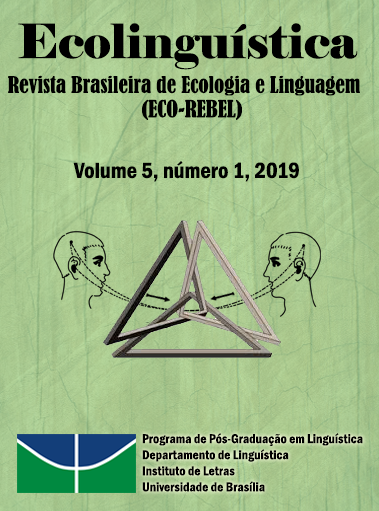Environmental linguistics
Keywords:
Ecolinguística; Linguística Ambiental; Linguística Ecossistêmica.Abstract
The main objetive of this article is to show that the majority of what is done under the name “ecolinguistics” is, in fact, envivonmental linguistics as defined here. This is because they deal with environmental, antienvironmental, pseudoenvironmental texts-discourses and similar subjects. In this case, essays that can be considered as belonging to “environmental linguistics” have been produced before the emergence of ecolinguistics itself, as can be seen in the three examples mentioned below. In other words, any essay dealing with environmental questions, using linguistic literature belong to environmental linguistics, even when the author is not a linguist. If the text dealing with environmental questions is written by a sociologist, it belongs to envivonmental sociology; if it is witten by a psychologist, it is envivonmental psychology, and soo on.
Downloads
References
ALEXANDER, Richard. 2015. Sobre a necessidade de submeter o discurso ambiental contemporâneo à investigação reflexiva. Ecolinguística: revista brasileira de ecologia e linguagem (ECO-REBEL)v. 1, n. 2, p. 30-52 (5-8).http://periodicos.unb.br/index.php/erbel/article/view/16524/11767(acesso: 22/03/2017)
COUTO, Hildo Honório do. 2007. Ecolinguística: estudo das relações entre língua e meio ambiente. Brasília: Thesaurus. Seção VI(caps. 2, 3, 4, 5); seção VII (caps. 2, 3, 4, 5); seção VIII (cap. 3).
_______; COUTO, Elza; ARAÚJO, Gilberto; ALBUQUERQUE, Davi. (orgs.). 2016. O paradigma ecológico nas ciências da linguagem: Ensaios ecolinguísticos clássicos e contemporâneos. Goiânia: Editora da UFG (nesta coletânea há textos sobre todos os tópicos do programa).
FILL, Alwin. 1993. Ökolinguistik: Eine Einführung. Tübingen: Narr.
_______. 2015. Ecolinguística: a história de uma ideia verde para o estudo da linguagem. ECO-REBELv. 1, n. 1, p. 7-18 (5-8). http://periodicos.unb.br/index.php/erbel/article/view/15123/10834(acesso: 22/03/2017).
_______; MÜLHLHÄUSLER, Peter(orgs.). The ecolinguistics reader. Londres: Continuum (1).
HARRÉ, Rom;BROCKMEIER,Jens;MÜLHLHÄUSLER, Peter. 1999. A study of environmental discourse. Thousand Oaks, Cal.: Sage Publications (2). Mühlhäusler, Peter. 2003. Language of environment, environment of language: a course in ecolinguistics. Londres: Battlebridge (obre itens de 1 a 8).
RAMOS, Rui. 2009. O discursodo ambiente na imprensa e na escola: Uma abordagem linguística. Lisboa: fundação Calouste Gulbenkian / Fundação para a Ciência e Tecnologia (7, 8, 9).
_______. 2013. O rei de Espanha foi caçar elefantes: A construção discursiva do evento nos mediaportugueses. Cadernos de linguagem e sociedade v. 14, n. 1, p. 17-40 (7, 8, 10).
_______. 2015. O ambiente como argumento final na imprensa brasileira. ECO-REBELv. 1, 1, p. 95-106.Disponível em: http://periodicos.unb.br/ojs311/index.php/erbel/article/view/9970/8803(acesso: 27/12/2018).
Downloads
Published
How to Cite
Issue
Section
License
Authors who publish in this journal agree to the following terms:
Authors retain copyright and grant the journal the right of first publication. The work is simultaneously licensed under the Creative Commons Attribution License allowing the sharing of the work with acknowledgment of the authorship of the work and initial publication in this journal.
Authors are authorized to enter into additional contracts separately for non-exclusive distribution of the version of the work published in this journal (e.g., publishing in institutional repositories or as book chapters), with acknowledgment of authorship and initial publication in this journal.
Authors are allowed and encouraged to post and distribute their work online (e.g., in institutional repositories or on their personal page) at any point before or during the editorial process, as this can bring about productive revisions as well as increase impact.
Citation of published works (See The Effect of Free Access).



3.png)



